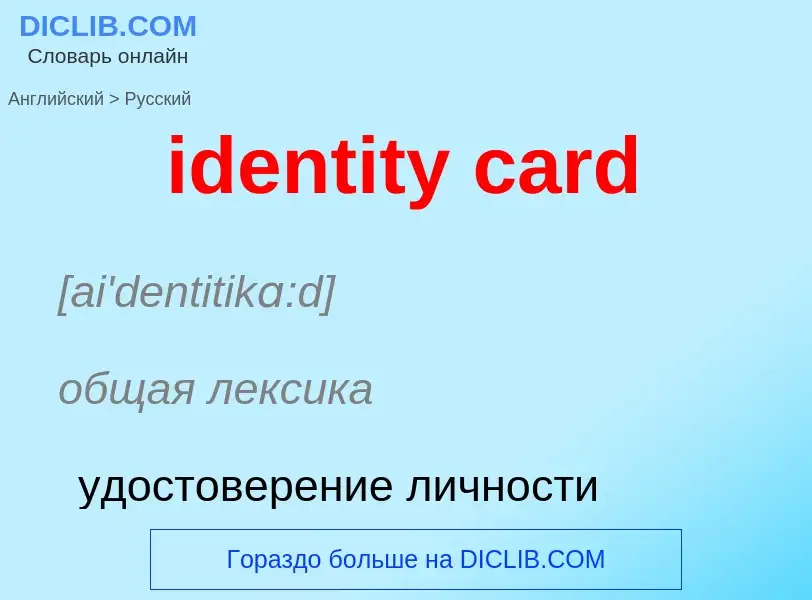Übersetzung und Analyse von Wörtern durch künstliche Intelligenz ChatGPT
Auf dieser Seite erhalten Sie eine detaillierte Analyse eines Wortes oder einer Phrase mithilfe der besten heute verfügbaren Technologie der künstlichen Intelligenz:
- wie das Wort verwendet wird
- Häufigkeit der Nutzung
- es wird häufiger in mündlicher oder schriftlicher Rede verwendet
- Wortübersetzungsoptionen
- Anwendungsbeispiele (mehrere Phrasen mit Übersetzung)
- Etymologie
identity card - Übersetzung nach russisch
[ai'dentitikɑ:d]
общая лексика
удостоверение личности
2) кредитная карточка клиента банка
Definition
Wikipedia
An identity document (also called ID or colloquially as papers) is any document that may be used to prove a person's identity. If issued in a small, standard credit card size form, it is usually called an identity card (IC, ID card, citizen card), or passport card. Some countries issue formal identity documents, as national identification cards that may be compulsory or non-compulsory, while others may require identity verification using regional identification or informal documents. When the identity document incorporates a person's photograph, it may be called photo ID.
In the absence of a formal identity document, a driver's license may be accepted in many countries for identity verification. Some countries do not accept driver's licenses for identification, often because in those countries they do not expire as documents and can be old or easily forged. Most countries accept passports as a form of identification. Some countries require all people to have an identity document available at all times. Many countries require all foreigners to have a passport or occasionally a national identity card from their home country available at any time if they do not have a residence permit in the country.
The identity document is used to connect a person to information about the person, often in a database. The connection between the identity document and database is based on personal information present on the document, such as the bearer's full name, age, birth date, address, an identification number, card number, gender, citizenship and more. A unique national identification number is the most secure way, but some countries lack such numbers or don't show them on identity documents.



![[[Bosnian identity card]] [[Bosnian identity card]]](https://commons.wikimedia.org/wiki/Special:FilePath/Bosnian ID card B.gif?width=200)
![Bulgarian ID card]] Bulgarian ID card]]](https://commons.wikimedia.org/wiki/Special:FilePath/Bulgarian identity card.png?width=200)



![Argentine]] DNI Card Argentine]] DNI Card](https://commons.wikimedia.org/wiki/Special:FilePath/DNI Argentina 2020 Frente.jpg?width=200)
.png?width=200)
.png?width=200)
.png?width=200)






.png?width=200)
![Albanian electronic ID Card]] 2009 Albanian electronic ID Card]] 2009](https://commons.wikimedia.org/wiki/Special:FilePath/Leternjoftimi shqiptar biometrik...jpg?width=200)


![The [[Macedonian identity card]] The [[Macedonian identity card]]](https://commons.wikimedia.org/wiki/Special:FilePath/Macedonian id.jpg?width=200)
![[[Biometric]] Nepalese identity card [[Biometric]] Nepalese identity card](https://commons.wikimedia.org/wiki/Special:FilePath/National Identity Card (Nepal).png?width=200)
.jpg?width=200)
.jpg?width=200)
.png?width=200)
 (front).png?width=200)
(front).jpg?width=200)





![ID card issued in [[Taiwan]] ID card issued in [[Taiwan]]](https://commons.wikimedia.org/wiki/Special:FilePath/ROC mibunsho.jpg?width=200)


.webp?width=200)
![[[Turkish identity card]] [[Turkish identity card]]](https://commons.wikimedia.org/wiki/Special:FilePath/TR Nat ID Card Front.png?width=200)



![Smart ID]] Smart ID]]](https://commons.wikimedia.org/wiki/Special:FilePath/ZA Smart ID Front.png?width=200)

